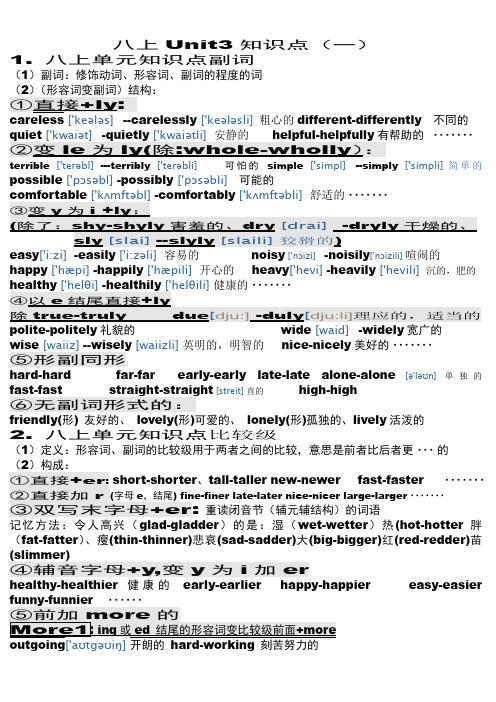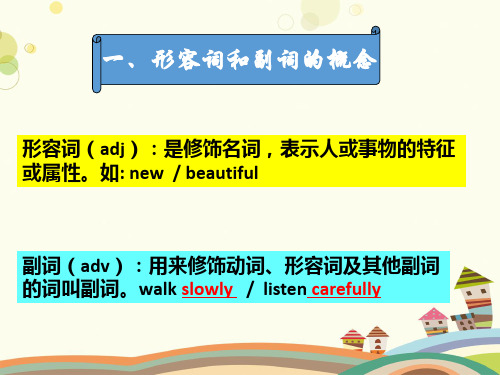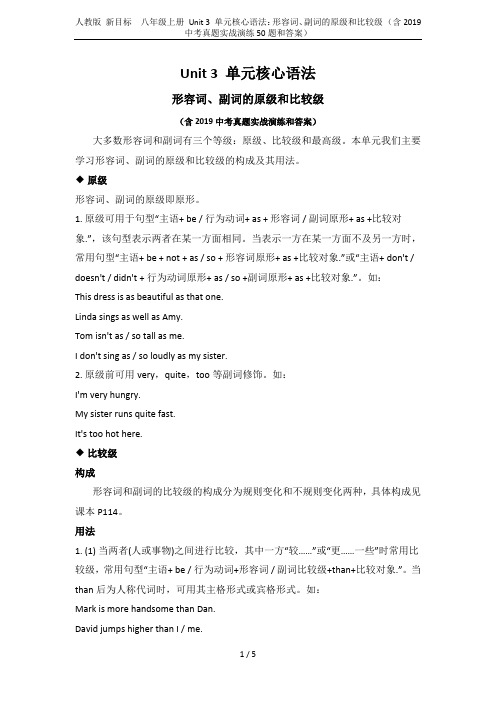unit3 形容词副词全部
英语八年级上册Unit3语法课:形容词和副词

the flowers smell so_____.
A. well
B. nice
C. wonderfully D. nicely
补充
1. 形容词/副词+enough、
enough+名词 (形前名后) He didn’t work__h_a_rd__e_n_o_u_g_h_.(够努力) Don’t worry, we have___e_n_o_u_g_h__ti_m.e
less
better
best
worse
worst
oldest eldest least
指年龄大小
只做定语, 表辈份长幼, 用于兄、姐
far farther further
farthest furthest
表 “距离远” 表 “程度上远”
两多,两好,两坏病,一老,一少,远距离
形容词副词比较级最高级的用法:
•作宾补: 放在宾语后,常与keep, make,find,feel,think等动词连用。 •We should keep our classroom clean and tidy. What he said made me happy.
•常用于下面的句型中: •keep sth +adj.
•make sb+adj.
Try to use the adjective to describe the pictures.
The dog is very cute. It’s a cute dog.
The girl is very beautiful. She is a beautiful girl.
$1,000,000
那个箱子和我的一样重 That box is as big as mine. as +原级 + as, 表“和……一样”
八年级英语上Unit3,语法

◇Look at the pictures and understand 看图并理解
big
bigger
◇Look at the pictures and understand 看图并理解
big
biggest
bigger
◇Look at the pictures and understand 看图并理解
比较级:两个人或物之间的比较。表示
“较……”或“更……一些”。标志词: than (比) 如: I am taller thቤተ መጻሕፍቲ ባይዱn her .(我比她高。)
1.比较级是两者进行比较,句中常出现 than(比)…,/ …or…(2者选择)
Who is more active, Mary or Kate?
fast
◇Look at the pictures and understand 看图并理解
fast
faster
◇Look at the pictures and understand
看图并理解
fast
fastest
faster
二、形容词和副词的级
形容词和副词有三个等级: 原级、比较级、最高级
注:older 一般比年龄,新旧; elder指长幼关系(一般修饰名词); elder brother/sister farther指距离更远; further指抽像的. I want to study English further.
给出下列词的比较级和最高级
important ______________ _________________ most important more important easier easy___________________ ___________________ easiest wettest wet___________________ ____________________ wetter happy________________ ____________________ happier happiest more careful most careful careful ________________ __________________ thinner thinnest thin _________________ __________________ better best good________________ ____________________ hotter hottest hot __________________ ____________________ more easily most easily easily ________________ ____________________ most more many________________ ____________________ nicer nicest nice ________________ ____________________ bigger big _________________ ____________________ biggest heaviest heavy______________ ____________________ heavier most delicious delicious____________ ____________________ more delicious most more much_______________ _____________________
陕旅版英语六年级英语上册Unit 3 知识清单

Unit 3Care for the Earth一、核心词汇1. 名词: earth地球thing东西;事物2. 动词: pick采;摘waste浪费drive驾驶;开(车)think想;认为3. 形容词: dirty脏的4. 副词: also也;同样only只;仅仅5. 代词: something某事;某物6. 限定词: more更多的7. 短语: care for关爱;照料pick flowers摘花cut down砍伐;把……砍倒make the air dirty污染空气drive a car开车have to必须;不得不World Car Free Day世界无车日二、拓展词汇1. 名词: people人们2. 动词: find找到should应该see明白;理解make使成为;使变得live居住;生活3. 形容词: poor可怜的bad坏的, 不好的helpful有益的;有帮助的4. 介词: by搭乘;通过with和;跟5. 副词: why为什么too也;太together同时;一起6. 连词: because因为7. 限定词: some一些many许多的much许多的all全部的;一切的三、核心句型1. Why not go in your dad’s car?为什么不坐你爸爸的车去呢?解读: 该句是用来向别人提出建议的句型.举一反三: Why not go to the gym with us?和我们一起去体育馆怎么样?Why not eat out?为什么不出去吃饭呢?2. — Why?为什么?— Because today is World Car Free Day. 因为今天是世界无车日.解读: 这是就原因进行问答的句型.当我们想知道某种现象的原因时, 可直接用Why?或含有why的特殊疑问句进行询问,回答时一般用because引出原因.举一反三: — Why are you sad today?你今天怎么不高兴?— Because my leg hurts. 因为我的腿受伤了.3. There are a lot of trees, flowers, rivers and mountains on the earth. 在地球上有许多树木、花朵、河流和山脉.解读: 该句是there be句型, 表示“某处(某时)有某物(某人)”.举一反三: There are some trees behind the building. 建筑物后面有一些树.There is some milk in the bottle. 瓶子里有一些牛奶.四、了解句型1. What’s the matter, little bird? 怎么了, 小鸟?解读: 该句为固定句型, 表示不明状况时, 询问对方“发生什么事了/怎么了?”后面可以加上介词with, 再加上人或物, 即 What’s the matter with + 人/物?同义句型What’s up?/What’s wrong?2. What should I do? 我该做些什么呢?解读: 该句是含有情态动词should的特殊疑问句, 意为“我该做些什么?”或“我该怎么办呢?”情态动词should意为“应该”, 没有人称和数的变化, 其否定形式是shouldn’t.其语气较为委婉、礼貌, 常用来陈述个人对某种现象的看法和观点.3. Some more soup, dear? 再添些汤吗, 亲爱的?解读: 该句是一个一般疑问句的省略句型,用来询问别人的意见.其完整句应该是Would you like some more soup, dear?。
五年级英语上册Unit 3 知识学习总结要点汇总(新起点小学英语)

五年级英语上册Unit 3 知识点汇总(新起点小学英语)五年级英语上册Unit3知识点汇总(新起点小学英语)Unit3TheBiggestandtheBest一语法:形容词和副词的最高级A.形容词(adj.)最高级1.概念:用于三者及三者以上的比较2.形容词变最高级:形容词前加the或形容词性物主代词(my,your…),词尾加est.例:Heisthetallestinourclass.whoisyourbestfriend?3.句首或句尾通常有介词短语表示比较的范围例:Inourclass,maryisthesmartestgirl.Heisthefattestofthree.4.句式结构:A+be动词+the+形容词最高级+介词短语(表范围)注:介词短语可置于句首,或在比较范围为大家所熟知时省略。
B.副词最高级1.well,hard,fast等词既可以做形容词又可以做副词。
在做副词用的时候,最高级紧接动词,前不加“the”。
例:Ithinkmathisthehardestofallthesubjects.Hestudieshardestinourclass.2.句式结构:A+动词+副词最高级+介词短语(表范围)二、特殊形容词/副词比较级与最高级形容词和副词的最高级一般以est结尾,以下是5类特殊的情况1)late—later—thelatestfine—finer—thefinestnice—nicer—thenicest2)pretty—prettier—theprettiestfriendly—friendlier—thefriendliestugly—uglier—theugliestfunny—funnier—thefunniest3)thin—thinner—thethinnestbig—bigger—thebiggestfat—fatter—thefattesthot—hotter—thehottest4)good/well—better—bestmany/much—more—mostlittle—less—least5)important—moreimportant—themostimportantpopular—morepopular—themostpopulartalkative—moretalkative—themosttalkative三基本句型1.whoisthetallestinourgroup?在我们组谁最高?完整回答:LiHuaisthetallestinourgroup.在我们组李华最高。
Unit3知识点 人教版英语八年级上册

八上Unit3知识点(一)1.八上单元知识点副词(1)副词:修饰动词、形容词、副词的程度的词①直接+ly:careless ['keələs] --carelessly ['keələsli] 粗心的different-differently 不同的quiet ['kwaiət] -quietly ['kwaiətli] 安静的helpful-helpfully有帮助的·······:②变le为ly(除:whole-wholly)terrible['terəbl]---terribly ['terəbli]可怕的simple['simpl] --simply ['simpli] 简单的possible ['pɔsəbl] -possibly ['pɔsəbli]可能的comfortable ['kʌmftəbl] -comfortably ['kʌmftəbli] 舒适的·······③变y为i +ly:(除了:shy-shyly害羞的、dry [drai] -dryly干燥的、sly [slai] --slyly [slaili] 狡猾的)easy['i:zi] -easily ['i:zəli] 容易的noisy ['nɔizi] -noisily['nɔizili] 喧闹的happy ['hæpi] -happily ['hæpili] 开心的heavy['hevi] -heavily ['hevili]沉的,肥的healthy['helθi]-healthily['helθili]健康的·······④以e结尾直接+ly除true-truly due[dju:] -duly[dju:li]理应的,适当的polite-politely礼貌的wide [waid] -widely宽广的wise [waiiz] --wisely [waiizli] 英明的,明智的nice-nicely美好的·······⑤形副同形hard-hard far-far early-early late-late alone-alone[ə'ləʊn]单独的fast-fast straight-straight [streit] 直的high-high⑥无副词形式的:2.八上单元知识点比较级(1)定义:形容词、副词的比较级用于两者之间的比较,意思是前者比后者更···的(2)构成:①直接+er: short-shorter、tall-taller new-newer fast-faster ·······②直接加r (字母e,结尾) fine-finer late-later nice-nicer large-larger·······③双写末字母+er:重读闭音节(辅元辅结构)的词语记忆方法:令人高兴(glad-gladder)的是:湿(wet-wetter)热(hot-hotter胖(fat-fatter)、瘦(thin-thinner)悲哀(sad-sadder)大(big-bigger)红(red-redder)苗(slimmer)④辅音字母+y,变y为i加erhealthy-healthier健康的early-earlier happy-happier easy-easier ⑤前加more的More1: ing或ed 结尾的形容词变比较级前面+moreoutgoing['aʊtɡəʊiŋ]开朗的hard-working 刻苦努力的interesting ['intrəstiŋ]—interested ['intrəstid] (有趣的)surprising [sə'praiziŋ] --surprised [sə'praizd] (惊讶的)relaxing [ri'læksiŋ]—relaxed [ri'lækst] (放松的)boring-bored(枯燥的) tiring ['ta iər iŋ]—tired ['taiəd] (劳累的) exciting—excited(刺激的) talented ['tæləntid]有才能的·······More2:形容词后+ly 变成副词的前面+morequickly快的carefully 小心的quietly['kwaiətli] 安静的seriously ['sɪəriəsli]严肃的 happily 快乐的luckily 幸运的·······注意:friendly—friendlier lovely—lovelier lonely ['ləʊnli] --- lonelier ['ləʊnliə] More3:多音节词和部分双音节词(1)7个字母以及7个字母以下的词语:比较级加more的顺口溜:现代流行怕细心modern ['mɔdn]popular['pɔpjələ] afraid[ə'freid]careful['keəfl]严紧(紧张的)诚实用耐心serious ['siəriəs] nervous[ˈnɜ:vəs]honest ['ɔnist] useful(或useless) patient ['peiʃnt]经常(正常的)(常见的)积极有帮助often['ɔfn] normal[ˈnɔ:ml] common/kɔmən/ active ['æktiv]helpful(helpless)基本出名古得开自然无害地加fun和upset (沮丧的)basic ['beisik] 、famous、ancient[ˈe inʃənt]open ['əʊpən] natural[ˈnætʃrəl]harmless (harmful)fun upset (2)8个字母以及8个字母以上的词的比较级全部加more ⑥不规则的特殊记忆well -----better bad或badly--------worse ][wə:s] little—----less far---—farther或further['fə:ðə] 更远的八上单元知识点①“····比较级than····”:····比···“···数字times+比较级+than····”:···是···的几倍(一倍once两倍twice+times)···比较级than any other + 单数名词:比其他任何都··今早我起得比我妈早。
人教英语八年级上册 Unit3形容词副词的比较级

四、超级:两者进行比较,强调比较 •的1.程mu度ch。/a lot+adj./adv.比较级 (+than...)“......得
多”
• eg: A is much quieter (than B).
• A walked into the room a lot more quietly (than before).
• eg: 1. Money, the more , the better.
• 2.The stronger our country is, the happier our life will be.
Gao Yuanyuan is as _b_e_a_u_t_if_u_l (漂亮) as Sun Li. Sun Li works as _h_a_r_d_ (努力) as Gao Yuanyuan.
much/a lot/a bit/a little/even+adj./adv.比较级
五、不断升级:某人或事物越来越...... adj./adv.比较级+and+adj./adv.比较级 六、因你而升:条件从句的主语越......,主句的主语......
the+adj./adv.比较级 ,the +adj./adv.比较级
good/well-better
6 (不规则的) bad/badly-worse
many/much-more little-less far-farther/further
一、低级:两者进行比较,表示“前 者不如后者”
• 1. A +谓语v.+less+adj./adv.原级+than B • eg: A is less hard-working than B. • A speaks less loudly than B. • 2. not+as/so +adj./adv.原级+as • eg: A is not as clever as B. • A doesn't sing as well as B.
英语八年级上册Unit3形容词与副词比较级

疑问副词 how, when, where, why
连接副词 however, how, when, where, why
more exciting most exciting
一、形容词原级的比较。 as +原级+as表“和……一样”的意思; not as/ so ……as
表“不如”或“不一样”。
1.The book is ___a_s_n_e_w__a_s that one.(一样新) 2.My bike is ___n_o_t_a_s__/_s_o_g_o_o_d__a_s_ yours.(不如…好)
以辅音字母结尾 双写辅音字母, thin-thinner-thinnest 的重读闭音节词 再加-er ,-est big-bigger-biggest
多音节和部分双 在词前加 more ,slowly,more slowly del
音节单词
most
more delicious most d
注意:以ing ,ed和 ly结尾的词在其前加more (the) most
加 –r ,-st
tall-taller-tallest small-smaller-smallest
nice-nicer-nicest large-larger-largest
以“辅音+y”结 尾的词
变y为i再加-er -est
,
dry-drier-driest happy-happier-happiest heavy-heavier-heaviest
人教版 新目标 八年级上册 Unit 3 单元核心语法:形容词、副词的原级和比较级 (含2019中

Unit 3 单元核心语法形容词、副词的原级和比较级(含2019中考真题实战演练和答案)大多数形容词和副词有三个等级:原级、比较级和最高级。
本单元我们主要学习形容词、副词的原级和比较级的构成及其用法。
◆原级形容词、副词的原级即原形。
1. 原级可用于句型“主语+ be / 行为动词+ as + 形容词 / 副词原形+ as +比较对象.”,该句型表示两者在某一方面相同。
当表示一方在某一方面不及另一方时,常用句型“主语+ be + not + as / so + 形容词原形+ as +比较对象.”或“主语+ don't / doesn't / didn't + 行为动词原形+ as / so +副词原形+ as +比较对象.”。
如:This dress is as beautiful as that one.Linda sings as well as Amy.Tom isn't as / so tall as me.I don't sing as / so loudly as my sister.2. 原级前可用very,quite,too等副词修饰。
如:I'm very hungry.My sister runs quite fast.It's too hot here.◆比较级构成形容词和副词的比较级的构成分为规则变化和不规则变化两种,具体构成见课本P114。
用法1. (1) 当两者(人或事物)之间进行比较,其中一方“较……”或“更……一些”时常用比较级,常用句型“主语+ be / 行为动词+形容词 / 副词比较级+than+比较对象.”。
当than后为人称代词时,可用其主格形式或宾格形式。
如:Mark is more handsome than Dan.David jumps higher than I / me.(2) 当询问两者中“谁更 / 哪一个更 / 什么更……”时,常用句型“Who / Which / What+ be + 形容词比较级, A or B?”或“Who / Which / What +行为动词 + 副词比较级, A or B?”。
- 1、下载文档前请自行甄别文档内容的完整性,平台不提供额外的编辑、内容补充、找答案等附加服务。
- 2、"仅部分预览"的文档,不可在线预览部分如存在完整性等问题,可反馈申请退款(可完整预览的文档不适用该条件!)。
- 3、如文档侵犯您的权益,请联系客服反馈,我们会尽快为您处理(人工客服工作时间:9:00-18:30)。
2) 以字母 e 结尾加 –r
fine – finer late – later nice – nicer
3) 重读闭音节、末尾只有一个辅音 字母时双写加 –er
fat – fatter big – bigger thin – thinner wet-wetter
4) 以辅音字母加 y 结尾变 y 为 i 加 –er
5.形容词的比较级
补充: be good at 的比较级 be better at do well in 的比较级 be better at be bad at 的比较级 be worse at do badly in 的比较级 do worse in
(二) 用所给词的适当形式填空: 1.My home is ( far )_____ than _____( you ). 2.Bill is _____ ( heavy ) than Tom. 3.Which do you like _____ ( good )? 4.Nobody is_____ ( smart) than Li Tian in class. 5.The elephant is _____ (big ) than the horse. 6.Mr. Smith si much _____ ( old ) than his wife. 7.She is _____ ( healthy ) than her brother. 8.The car goes_____ ( fast ) than the bike.
副词的构成
1. 形容词+ly构成副词 e.g. different differently bad close closely free clear clearly bright dangerous dangerously slow careful carefully correct neat nice neatly badly freely brightly slowly correctly nicely
副词: 1.作用 2.构成与变化 3.分类
A 副词的作用
1.用来修饰
动词
形容词
副词
2.说明时间,地点, 程度,方式等, 做状语.
全句
• Many birds live there __________ (快 乐地生活) all year round, they can_________(容易地抓) catch fish for food.
than
John
Tom
注意:
1.比较的时候需要留意,必须是同类事物相 比较。eg: My hair is longer than his hair.(不能用he) I am taller than him.(不能用his) 2.比较的时候需要注意,than 后用人称代词 的宾格。eg: Jack is more outgoing than me.(不能用I, 但是可以用I am)
1. John’s eyes are bigger than Tom’s. 2. Tom’ s hair is longer than John’s. 3. My brother is more serious than____(I). 4. Do you think Lily is better at English than ___(she)?
注意4:.有些词的形容词与副词的形 式一样.
far
hard high long straight
fast early
late
形容词和副词 比较级和最高级的构成
规则变化 单音节词和少数双音节词
1) 一般情况加 – er
fast – faster high – higher tall – taller
• Lily is the taller of the twins • Tony has the more books of the two.
the younger Jay is ______________ of the two.
3.形容词的比较级
原级比较法
I hope this book is as good as that one. As…形容词(副词)原级…as 与…一样 She is not as young as my sister. The horse can’t run as fast as it did. Not as/so …形容词(副词)原级…as 与…不一样 / …不如…
注意: 2. true truly 它的形容词变成副词时是去e 再加 -ly
注意:3. 并非以-ly结尾的词都是副词 He is _____ (live), clever and outgoing. lively adj. Our neighbours are ________ (friend) friendly and we are happy here. adj.
形容词和副词
Adjectives and Adverbs
形容词、副词
1. 形容词作定语的位置
1. 2. 3. 4. He is a tall man. It’s a beautiful present. The red pencil is mine. There is something wrong with the watch. 5. Is there anything special? 6. There is nothing new.
注意1: Simon looks ______.
A. happy
B. happily
• Simon looked _______ at me because I broke his glasses. A. angry B . angrily
中考链接: As the trip was pleasant, they didn’t feel __________(疲劳) at all.
•副词修饰动词
These trousers are_________( 太短),I prefer to wear jeans.
副词修饰形容词
I couldn’t jump _______________(够 高 ) to reach the maple leaves. 副词修饰副词 ______(难过的是),it’s very difficult for giant pandas to survive in the wild. 副词修饰全句
双音节,多音节和+ly的副词比较级 和最高级用more/ the most
• • • • • • delicious popular wonderful slowly happily carefully
more delicious
more popular more wonderful more slowly more happily more carefully
early – earlier easy – easier lucky – luckier friendly-friendlier
不规则变化
good/well – better bad/badly/ill – worse many/much – more little – less far – farther ( far – further )
2.肯定形式:as + adj.(原级)+ as …
意为"和……一样",表示同级的比较
否定形式:not as/so +adj.(原级) +as…
4.形容词的比较级
注意:
在形容词和副词的比较级前,可以用much,a little, a lot ,even ,much等词修饰。 eg: Jack is much lazier than Lily.(lazy) Frank is a little frendlier than his brother.
根据要求写出下列单词的正确形式: 1.easy(副词) easily 2.correct(副词) correctly 3.quiet(副词) quietly 4.polite(副词) politely 5. noise(副词) noisily 6. heavy (副词) heavily 7. luck(副词) luckily 8. angry(副词) angrily
பைடு நூலகம்
The cake Mrs Black made looks _______, but it tastes _______. A.bad; good B. bad; well C.badly; good D. badly; well The food on the plate smells ________. You can’t eat it. • delicious B. badly C.well D.bad
2.形容词的比较级
比较级用法 the+比较级+of the two 表示两者中较 为……的一方 She is cleverer of the two girls . 练习:Lily 是双胞胎中较为高的一个. Tony 有的书是两个中较多的一个.
Lily 是双胞胎中较为高的一个. Tony 有的书是两个中较多的一个.
1.形容词的比较级和最高级
比较级用法 1) 形容词比较级+than, 表示一方超过另 一方. She is cleverer than the other girls in her class. 练习:这间房子比那间房子大. 这本书不如那本书有趣.
这间房子比那间房子大. 这本书不如那本书有趣.
• This room is bigger than that one. • This book is less interesting than that one.
